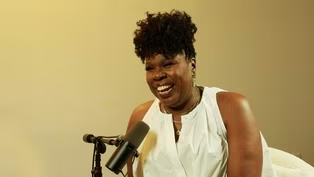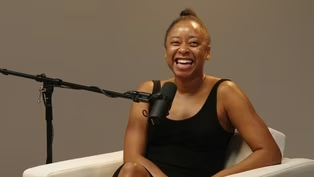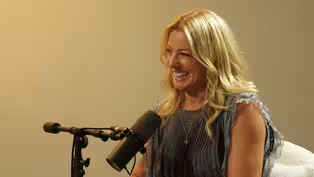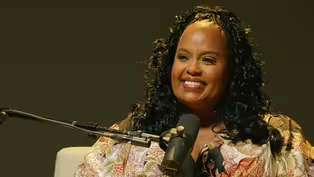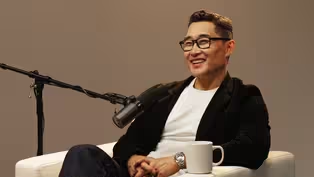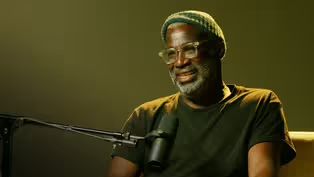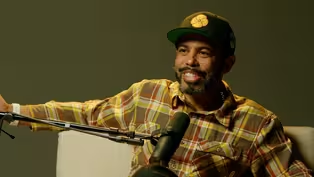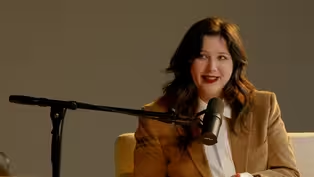
Phil Rosenthal’s Secret Recipe: Good Food and a Laugh
Special | 22m 53sVideo has Closed Captions
TV writer and host Phil Rosenthal talks about finding our shared humanity in food and comedy.
Writer, producer and host Phil Rosenthal makes television for the whole family. First, he created the Emmy Award-winning sitcom classic, "Everybody Loves Raymond." Now he has taken his vision to food and travel with "Somebody Feed Phil." Through this work, Rosenthal aims to emphasize our shared humanity through food and comedy.
Problems playing video? | Closed Captioning Feedback
Problems playing video? | Closed Captioning Feedback
Support for American Masters is provided by the Corporation for Public Broadcasting, AARP, Rosalind P. Walter Foundation, Judith and Burton Resnick, Blanche and Hayward Cirker Charitable Lead Annuity Trust, Koo...

Phil Rosenthal’s Secret Recipe: Good Food and a Laugh
Special | 22m 53sVideo has Closed Captions
Writer, producer and host Phil Rosenthal makes television for the whole family. First, he created the Emmy Award-winning sitcom classic, "Everybody Loves Raymond." Now he has taken his vision to food and travel with "Somebody Feed Phil." Through this work, Rosenthal aims to emphasize our shared humanity through food and comedy.
Problems playing video? | Closed Captioning Feedback
How to Watch American Masters
American Masters is available to stream on pbs.org and the free PBS App, available on iPhone, Apple TV, Android TV, Android smartphones, Amazon Fire TV, Amazon Fire Tablet, Roku, Samsung Smart TV, and Vizio.
Buy Now
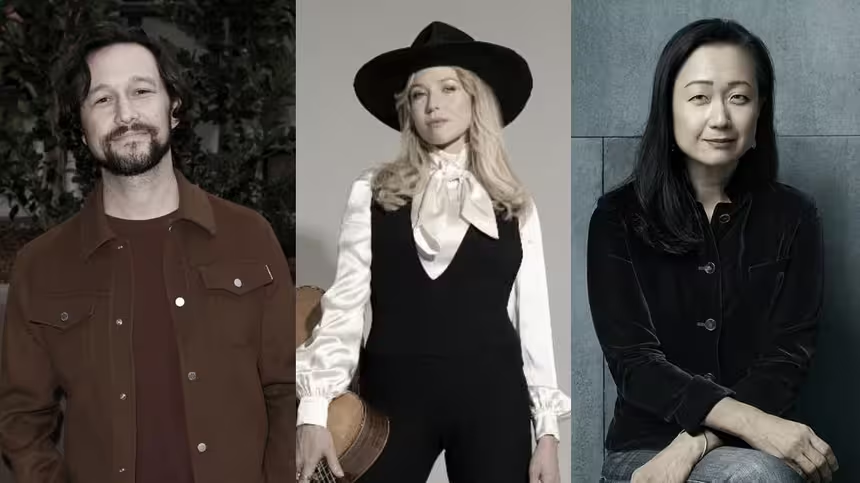
A front row seat to the creative process
How do today’s masters create their art? Each episode an artist reveals how they brought their creative work to life. Hear from artists across disciplines, like actor Joseph Gordon-Levitt, singer-songwriter Jewel, author Min Jin Lee, and more on our podcast "American Masters: Creative Spark."Providing Support for PBS.org
Learn Moreabout PBS online sponsorshipMore from This Collection
How do today’s masters create their art? "Creative Spark" presents narrative interviews that go in-depth with an iconic artist about the creation of a single work. Each episode offers a unique window into the world of art and the creative process of artists and cultural icons across a wide range of disciplines, from music and comedy to poetry and film.
How Leslie Jones Became a Comedian
Video has Closed Captions
Comedian and actress Leslie Jones does a deep dive on her creative process. (31m)
Phoebe Robinson Shows Her Work
Video has Closed Captions
Comedian Phoebe Robinson takes on hustle-culture in biting comedy special. (31m 45s)
Sarah McLachlan: Making Music to Connect and Heal
Video has Closed Captions
Singer-songwriter Sarah McLachlan opens up in a candid interview about making music. (37m 19s)
How Natasha Rothwell’s Life Brought Her to “The White Lotus”
Video has Closed Captions
Actress Natasha Rothwell on her creative process in "The White Lotus." (33m 40s)
Daniel Dae Kim Leads Spy Drama and Fights for Industry Change
Video has Closed Captions
Actor Daniel Dae Kim on his groundbreaking career and new project, "Butterfly." (21m 48s)
Tunde Adebimpe Channels His DIY Roots Into Raw Solo Debut
Video has Closed Captions
Musician Tunde Adebimpe on his creative process behind his solo album debut. (37m 28s)
Daveed Diggs Takes on Cyberpunk Rap
Video has Closed Captions
Rapper and actor Daveed Diggs on his creative process as a rapper and songwriter. (25m 28s)
Lucy Dacus Makes Her First Loves Songs
Video has Closed Captions
Singer-songwriter Lucy Dacus talks about love songs for her new album, "Forever is a Feeling." (23m 49s)
Providing Support for PBS.org
Learn Moreabout PBS online sponsorship- Laughter equates with love in my mind.
And I think it's true.
That's what holds us together.
You're gonna fight.
That's human nature.
You're gonna be frustrated with each other.
That's marriage.
But if you can laugh, that's the love underneath.
- And what's more universal than food to go with it?
- It's everything.
So, food I find is the great connector.
We all gotta eat.
If you and I don't know each other and we're not doing a podcast together, we're probably gonna meet over lunch, right?
And food comes, and right away, no matter where you are from the world, you know how to do that.
You know how to eat.
We all got to eat.
And it's something we relate to and we see each other doing it.
And if it's good, we're already in a good mood.
And if we laugh, now we're friends.
So, food is the great connector and laughs are the cement.
(gentle music) - Hey, I'm Joe Skinner.
And this is "American Masters: Creative Spark."
In each episode, our guest breaks down their creative journey behind a single work of art.
And that infectiously enthusiastic man is Phil Rosenthal, best known for creating the hit sitcom, "Everybody Loves Raymond."
- We've been married 46 years.
We've seen the lows and we've seen the highs.
- What day was the high?
(audience laughing) - It's a show about family.
And it's critically received for being decent and heartwarming.
It's an attitude that is also key to Phil Rosenthal's latest work as host of the travel and food show, "Somebody Feed Phil," where he's still occasionally palling around with the stars from "Everybody Loves Raymond."
- I really do wanna bite into the bone.
- You wanna zobble the bone?
Take a bite from one end, give it to me.
I'll take a bite and will give- - Oh my goodness.
- Give a bite to- - Are you really gonna do that?
- Why not?
- You don't have to do it when you're here.
- Take a bite from one end.
- Start on the hoof.
- Oh my God.
(producer laughs) - See?
This is, we're brothers, we do it.
You're gonna do it too.
- I ain't gonna do it.
- Yeah, you're gonna.
- In each episode, Phil Rosenthal explores a new city or region of the world and tries its food and meets its people.
But of course, central to any project that Phil's engaged in is his search for that combination of humor and heart.
So first, I wanted to figure out the origin of that pursuit in his life and work.
I grew up watching "Everybody Loves Raymond."
And it was just like a nice blanket to come home to- - Yes.
- After school, you know?
- It's the values I was raised within my family.
My family was very funny.
My parents were really funny.
And the proof of that is that the parents on Raymond were loosely based on them.
Little bit of Ray's parents too.
But a lot of my parents and they're, the way they were at home influenced my whole life.
When we weren't yelling, we were laughing.
And that was just, you know, I think it's our most underrated human trait is our sense of humor.
I believe it's who, how we choose who to be friends with.
Not that you and I have to have the exact sense of, same sense of humor, but if you appreciate mine and I appreciate yours, now we can be friends.
And that I think is so strong.
I would go so far as to say it's who we marry.
And that the sense of humor is actually what keeps you married or keeps you in a relationship.
Because if you're not laughing anymore, it's you know, it's not fun anymore.
My mom first laid eyes on my dad when he did an amateur night in a club in New Jersey.
He got up and told old jokes and she was on a date with somebody else.
And she said, "I like that funny guy.
That kid who was a tailor in the garment center."
So, I owe everything to his sense of humor and her sense of humor appreciating it.
So, everything I did in my life was to try to be like him, and to try to be funny.
- Phil's parents were named Helen and Max Rosenthal.
And before their passing, at the end of each episode of "Somebody Feed Phil," they'd catch up with their son and rib him about his travels and food adventures.
- P. H. - I know how to spell.
- [Off Camera] Do you know the name of the show?
- Yeah.
- [Off Camera] What is it called?
(gentle lilting music) Who's Feeding Phil?
- Lemme try it.
(Helen wheezing and laughing) - When you were growing up, what was your relationship to food at home?
You talk about the matzo ball soup.
- Yes.
That was her one great dish.
Everything else, not as good.
(Joe laughs softly) And so, I didn't really have exciting food at home.
We didn't have a lot of money.
The cuisine, I would say was cheap.
Was whatever we could afford.
And mom worked, dad worked.
They had two screaming monsters at home, me and my brother.
So, we were lucky to eat at all with the time that they had and the money that they had.
And so, it was not thrilling and it wasn't very good.
And so, I begged to go to McDonald's.
I begged for anything with flavor.
And it wasn't until I left the house that I had food with real flavor.
I didn't have garlic until I was 18 years old when I went to college.
Didn't have that flavor, didn't know it existed.
- You know, I grew up in a small town in New Jersey.
- Yes.
- And the way that I would really sort of learn to socialize around food was going to diners.
- Oh, I'm a big diner guy.
Yeah.
- You know, I imagine in northern New York- - Yeah.
- Where you grew up.
- Yeah.
- Diners were probably a really big part of the experience.
- Huge.
- I've always found solace in the diner whether I, I moved around a lot as a kid.
And everywhere I lived, the diner was consistent.
- You hit on something very important that we look for in life is consistency.
There's comfort in consistency, right?
And comfort food means the food we know.
The burger, the sandwich, the fries, the shake.
That's food.
That is the definition of comfort food.
Food we know from childhood.
My favorite moment in any movie that has anything to do with food is ratatouille.
Ratatouille, when the critic eats the ratatouille and gets zoomed back to childhood to his mother fixing him a thing.
That transcends food to me.
That transcends why we are the way we are in life.
The things we pursue.
It all goes back to the feeling from childhood that got in somehow, right?
And became our defining character.
The thing we chase.
So, diners do that for people if they're good.
You know I'm opening a diner.
- Yeah.
I'd love to learn more about it.
(chuckles) - Well, I'll tell you.
We love diners so much.
They're in us.
They're part of our DNA practically.
It's where community lies.
It's where we've gone on dates.
We've had our friends after school.
Every function, everything.
Let's go to the diner.
Easy.
Like a second kitchen in your house is the diner.
So, this is very important.
I feel like diners are disappearing from America.
Why?
Because it's hard to maintain any restaurant.
And because it has a low price point, it's hard to maintain for regular people owning a diner.
But with that loss of that center of the community where people rich and poor can come and sit and you can talk to your neighbors over a cup of coffee or plate of eggs, or a sandwich or burger.
Maybe we lose the community.
And maybe with that, we lose the country.
So, I'm going to solve everything by having a diner.
And if you become a regular, now you start seeing the same folks.
And before you know it, you're talking.
And before you know it, maybe you can solve some of the problems of the town because you're all like-minded.
We're way more like-minded than the news would have us think.
- Right.
Yeah.
The diner, it just feels quintessentially American to me.
- Yes.
- In that way.
I mean, born of the highways and the sort of heterogeneous mixture of America that can all come together in that space and share in some eggs.
- It's so important.
And to me, it's at the heart of what my show's been about for these eight seasons.
That's the center, is the sense of community that you get when you eat with your neighbors.
And I use the term neighbors to mean not just the neighbors on your block.
The neighbors in your town, in your state, in your country, in the world.
So, once you have that attitude, everyone's your neighbor.
(somber music) - Phil Rosenthal has leveraged this concept into eight seasons of culinary adventures with the most recent season tackling Amsterdam in the Netherlands,.
Basque Country in Northern Spain, Boston, Tbilisi in Georgia, Sydney and Adelaide, Australia, Las Vegas, Manila, and Guatemala.
But what really separates Phil from a food show host like Anthony Bourdain, is that Phil's actually never been a chef, and he's even kind of afraid of a lot of food.
- I sold the show with one line.
This is true.
And I sold to PBS first.
It was, "I'm exactly like Anthony Bourdain if he was afraid of everything."
(Joe laughs softly) So, they understood the difference between his character and my character.
'Cause these are all character-based shows.
No matter whether it's Samantha Brown or Rick Steves or Stanley Tucci, or any of these people who are in this field.
I think you're watching because it's the character that you wanna follow through the journey, just like you would any movie or any sitcom or anything like that.
And I understood that my personality, I noticed when I'm watching Bourdain, I'm going, "He's incredible.
I'm never doing that."
I'm never going to get my chest tattooed by drunken Borneo tribesmen hammering nails into his chest.
This is not Phil, this is not me.
Even the title of my show suggests someone who needs to be taken care of, right?
So, I got it.
And my brother is my producer, so he puts me in situations that he knows I'm gonna be uncomfortable with.
And I understand that's why people might watch.
To see me get a little nervous or worse.
The first season on PBS when we went to Tokyo.
Here comes a salad and there are ants on it.
And I was not thrilled.
But I thought right then and there, "You wanted a food show.
Here it is."
If you're gonna walk the walk, right?
All right, folks, I'm going to eat my first ant.
Now, I've gone on record as saying I'm not eating bugs.
I'm not interested, but I'm in the hands of a master.
So, I guess you gotta try it.
(gentle rhythmic music) It took all the courage I could muster to bite down.
And this was not a little ant.
This was like a big carpenter.
And I bit down on this and it crunched, and I thought I was gonna pass out.
But it was like someone put a drop of lemon on my tongue.
So now the question's "Did you base this in lemon?
Is that why they tasted?"
He goes, "No, these particular ants from this particular part of the forest in this particular part of Japan, they taste like lemon."
Who found this out?
Somebody had to eat a lot of ants to find a lemon ant, right?
But I thought this is, it's like magic.
It's like a magic trick.
Now, do I seek out bugs when I go to restaurants now?
No.
But if some of them are on the menu in different countries.
First of all, I don't wanna be rude to my hosts, so I'm gonna try, unless it's so, I mean, I do have my limits.
But I, most of the time I'm going to be polite.
Even in my reactions to foods that I don't like, I'm always gonna be polite as you would be at a dinner party.
Things I really don't like, you don't see them in the show.
I'm not there to be negative.
I only want to help the businesses that we go and visit and turn you on.
I have a limited amount of time, so why dwell on the negative?
There's enough of that.
- I love that.
What are you trying to say about the global community and what can we learn about, you know, the immigrant experience through food?
- Most people are sweet and nice.
I'm not preaching this.
I'm not editing this to show you the world the way I want it to be.
I'm only showing you the world the way I find it.
That's what I'm finding.
Most people are sweet and nice.
You know, the news only shows you the extraordinary, the thing that isn't the every day.
I went to a place in Israel where Arabs and Jews live in the same town, Akko.
The mosque is next to the synagogue.
But the news doesn't say, "Did you hear about the Arabs and the Jews in this town?
They met in the center of town today.
And you know what happened?
They had lunch.
Like they do every..." (Joe laughs softly) Because most people in the world actually do want to live in peace and harmony with their neighbors.
This town, they celebrate each other's holidays.
Isn't there room for that a little bit on the news?
It doesn't sell.
But I think especially now, we need to hear these stories just to have faith to continue.
So, I also find, to answer your question about the immigrant experience.
Everywhere I go now, immigrants have immigrated to cities around the world.
Every single one of them has been made better by the immigrant population.
Most immigrants are fantastic and make the town better, more alive.
Hardworking business people, great cultures and cuisines.
One of my favorite shows we've ever done is "Orlando."
And "Vegas" this year.
Similar shows.
Why?
Orlando and Vegas have this giant commercial center in the middle.
We all know what it is in Orlando and we know what it is in Vegas, right?
The strip.
These commercial hubs have been built and are maintained by their immigrant population who've come to build and maintain these places.
These immigrants have set up their communities around the center.
So, off-strip, you hear about off-strip in Vegas.
That's where the big Chinese community is.
That's where the big Indian community is.
That's where, same with Orlando.
They've all come there to build and maintain Disney World.
And the real magic kingdom is the real world outside these places.
So to me, that's everything.
They brought their cultures and cuisines with them and they're microcosms of America now.
And every city has some of that.
I had Lao food in Oklahoma City that blew my mind.
I don't think 20 years ago you would've seen this.
So, this is fantastic.
And I'm seeing it in every city that I go to in the world.
We seek it out.
It's very easy to find.
But it's wonderful to find the unexpected.
I think human beings as a species are way better when they cross pollinate.
We learn and get great stuff from each other.
And that enriches the culture.
- Are you mapping out different cultures that you wanna be sharing with your audience?
- When we started, it was just places I wanted to go.
That I thought would, and I feel like we started with Earth's Greatest Hits.
You know, Paris, Tokyo, Barcelona, and cities like this.
Big cities, big tourist attractions.
Now, we're getting off the beaten path a little bit.
I don't know if you saw the episode we did in Tbilisi in the former Soviet Georgia.
But what I do is I'll look up on Google "best places to eat Tbilisi."
And because I know the show is we need the food to get us through the episode, right?
That's where I'm meeting the people.
That's where I'm talking to the people.
Everything to do with food is fair game.
Even the charitable moments, they have something to do with feeding people.
For the most part.
Or arts and culture or architecture.
Anything else that brings a tourist to a place.
We're gonna film there for a week and we're gonna condense that week into less than an hour.
Then, I do have something that may be you don't have, which is a production company in New York, and they used to be Bourdain's production company.
So, they'll tell me, "No, that pizza place is not the best pizza place in Tbilisi.
This is the best pizza place."
- Wow.
- "So, let's go here."
As a matter of fact, they'll say like, "Oh, Bourdain went there 10 years ago."
So I'll say, "Do we still wanna do that?"
And sometimes they'll say yes or no, depending on whether they think my attitude will be way different than his, which it usually is because I am not an expert in any way.
I am not a chef.
In fact, I can't really cook.
I inherited this talent from my parents.
(Joe laughs softly) But I am excited about it.
I love chefs, and the more I eat and travel, the more I know about eating and traveling.
Just as you would if you went out a lot.
So, I'm a tourist, but I'm a curious tourist, which is what I'm trying to encourage the audience to be.
Don't be the ugly, what they call the "ugly American."
Meaning, "I'm here.
Let me just eat a McDonald's.
Get my souvenir that was made in China and then go."
Explore a little, be curious about the culture, be curious.
And a great way to start your journey, I find, into the culture of a place is to eat it.
So, that's what we do.
And we leave room in the schedule for serendipity, for stuff to happen.
To walk down the street and have somebody say, "Have you been here?
This is the best ice cream you've ever had in your life."
Let's go.
We travel light and loose, and we can go in and do that.
- Yeah, so are there any unexpected moments from this new season that you can think of?
- Oh yeah.
I was going to a thing in the Basque Country.
A dinner, a dinner club.
And we were told, "Go and catch a chicken for the dinner."
So, I had to go to a chicken farm and chase down a chicken.
Not easy, by the way, if you're not a farmer.
I'm a kid from New York, and I have to go catch a chicken and I caught a chicken.
And the moment I held it, the first thing that happens is that the chicken is squawking, squawking, squawking until you catch it.
And then, you have it.
And now, the chicken knows it's caught.
It's a weird strange submission that happens in the chicken.
It's not struggling to get away, it just submits.
And the moment that happened, I realized one thing, I was not going to kill this chicken.
I was not taking this chicken to be killed.
Not that I was ever gonna kill it, but this was gonna be my contribution to the dinner was this chicken.
And I say, and the thing I'm not proud of myself.
I'm decidedly a hypocrite.
I will go and have roast chicken tonight.
I just didn't want it to be the one that I connected with for two minutes.
- [Joe] Hmm.
- And held it and felt its breath, and felt it submit gently, almost knowing, "I guess my life is over."
Wow.
That's a powerful moment for me.
Did it change me into a vegetarian?
No.
I just hypocritically said, "Not my chicken.
You're not taking my chicken today."
- I think the show gets at something with this idea that, you know, we all are just kinda complicated, mushy people in this world.
And it's more realistic to me that we have these moments and we have these contradictions and hypocrisies, even like you said.
- Absolutely.
The only conviction I have is to be as human as possible.
But that is way more loving, I think, than not to be human.
My show is not political in any way.
But just in today's day and age, the embracing of people from other cultures is suddenly a political statement.
That's stupid.
That's inhuman to think that way.
We need each other, right?
We are all interconnected no matter where we are in the world.
Someone suffering over here does affect me.
You can't see it.
If you see it and you're not affected in some way with just maybe a twinge of emotion for another human being who is suffering, you're a little less human than you should be.
(relaxing music) - [Joe] Well, I think that's a beautiful note to end the conversation on.
Thank you so much for coming in.
- It's my absolute pleasure.
(relaxing music) - [Joe] That's our show.
A big thank you to Phil Rosenthal for joining us.
Just a reminder that you can watch this episode and more on our channel on YouTube at youtube.com/AmericanMasters.
Subscribe while you're there for more American Masters content.
"American Masters: Creative Spark" is a production of the WNET Group, media made possible by all of you.
This episode was produced by me, Joe Skinner.
Our Executive Producer is Michael Kantor.
Original music is composed by Hannis Brown.
This episode was mixed and mastered by Jon Berman.
Funding for "American Masters: Creative Spark" is provided by The Rosalind P. Walter Foundation, The Anderson Family Charitable Fund, The Marc Haas Foundation, Sue and Edgar Wachenheim III, The Charina Endowment Fund, The Ambrose Monell Foundation, The Kate W. Cassidy Foundation, and The Philip and Janice Levin Foundation.
Thanks.
See you soon.
Support for PBS provided by:
Support for American Masters is provided by the Corporation for Public Broadcasting, AARP, Rosalind P. Walter Foundation, Judith and Burton Resnick, Blanche and Hayward Cirker Charitable Lead Annuity Trust, Koo...

